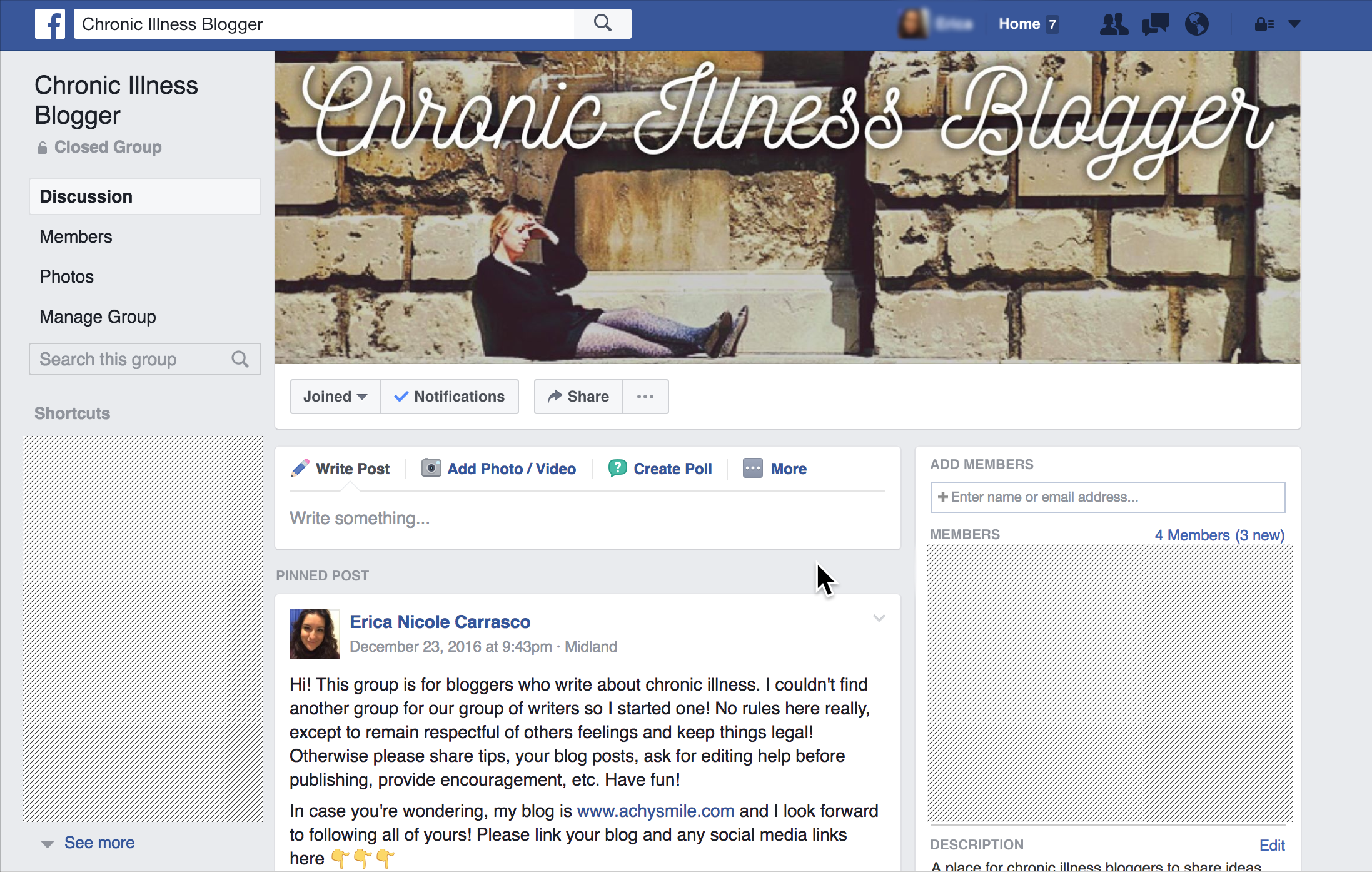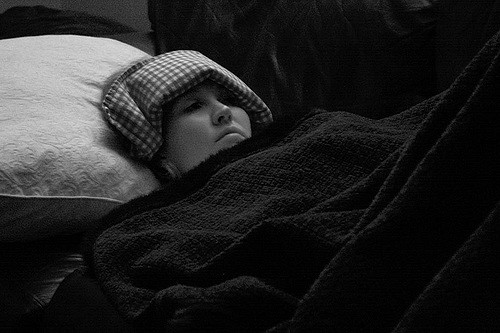What do you think of when you hear the doctor use the term “Abdominal Migraine” and you’re sitting next to your cute-faced, smiling child who is the patient? You think, “how can all of this be a migraine?” I know that’s what you’re thinking, because I was that mom. I was sitting in a chair with my husband, both scared out of our minds, after many tests and brain scans awaiting the results. Our baby girl was around 7 years old and we were terrified.

Marissa would wake up several mornings at 5 a.m. screaming. We’d jump out of bed, eyes blurry and feet wobbly, rush to her bedside and find her balled up on her bed. She’d complain of nausea, want the room dark, and her door closed. Her little face was red from “squenching.” At about Noon, she’d vomit. End of story. She was back to her happy-go-lucky self, playing outside like NOTHING had happened. WHAAAAAT?!
At first we figured it was a bad stomach ache or stomach bug. After a few days of this sporadically a few times a month or a couple of times within a six month period, we knew it was more than food poisoning. As a mom with migraine, I knew something was up. I wondered if it was migraine, but I was in denial. I even took to Google to find answers before we set up appointments. I REALLY didn’t want her to have migraines. It is every migraineur’s nightmare to have their child or grandchild suffer. My husband didn’t believe it was migraine and instead left it up to doctor’s to figure out. Which we both felt was best and made an appointment with her pediatrician, who referred us to a pediatric neurologist. Marissa’s pediatrician agreed that it was not something she could treat and felt a neurologist was the best route to follow.
The first thing the pediatric neurologist has us do is take her for an MRI of the brain. I’d had them, so I already knew what to expect. BUT, it’s not the same when you’re not the one on the table and all you can do is wait in the waiting room. I had no idea if she was scared, cold, nervous, or lonely. I cried, I cried so much during this time. I was scared, cold, nervous, and not so lonely anymore. I had a migraine buddy that I didn’t want. I didn’t have to be so scared though, she was as happy as can be coming out of the room in her little bitty gown, smiling away. Marissa was a sweet girl, so happy and joyful all the time. She was my little sunshine. So to see her hurting hurt us all. We needed answers.
We sure did get answers, both relief and worry. Abdominal Migraine. At this point, though, I had done enough research on my own to know this before his confirmed diagnosis. When I research, I use Google Scholar, which provides search links to verified medical journals. I knew I could trust these sources. I used Google Scholar a few years prior to help me learn more about my own migraines as well. Marissa’s neurologist explained that he wasn’t surprised given that I have complex migraines and told us how to help her from here on out. I honestly don’t remember what medications he prescribed. I just know “knowing” was half the battle. An incidental finding on her MRI results showed an “arachnoid cyst” and he told us he didn’t believe it was the source of the migraines. Although, he did tell us to get a new MRI every year for five years to make sure it didn’t grow in size. Last year we were told we no longer need to get annual MRI’s. It hadn’t grown in size since 2007, she’s good to go! She plans to do another MRI in a few years, though, for peace of mind.
A couple years after her Abdominal Migraine diagnosis, they mysteriously disappeared. It was the strangest thing. This lasted for about a year before returning as something else entirely. When Marissa approached her first menstrual cycle she had her first hormonal migraine. It was something we were not ready for. This time, though, we knew it was migraine. All the same symptoms appeared similar to abdominal migraine, but more intense and only around her cycle. This happened EVERY month.
We were desperate for help, as she was missing school every month. We agreed to allow her to take birth control and it worked. We were a little embarrassed and asked her to tell people, if they asked, that she was on migraine medication. Obviously, we had to tell her school what she was taking, but they understood. We didn’t even tell our family members for a long time. They just wouldn’t understand. She took birth control pills for her migraines until 9th grade. They lost their effectiveness. We decided to change her diet completely and it helped regulate her hormones, thus she was no longer triggering migraines at all. She went MONTHS without a migraine and she continued to have her periods. It was amazing. She has begun having them again, but because she no longer follows the eating plan I had chosen for her. She will see the benefit of eating a low-inflammation diet as she grows older. I talked with a neurologist and asked why this diet was so pivotal in her migraine treatment. She explained that hormones and inflammation go hand-in-hand. If you lower inflammation…you balance hormones. For some people, like Marissa, this impacts migraine.
By the time Marissa approached 6th grade, she was missing tons of school. She went into a depression, lost friends, and had to go through half a year of homebound schooling. Her teachers would come to our house everyday to teach her. She was in bed most of the time with severe vertigo and we visited several specialists. After many, many tests we were told she might have migraine associated vertigo (MAV) in addition to hormonal migraine. Then the vertigo mysteriously disappeared once summer approached. Weird right? We thought so too.
She was doing fine until the second semester of 7th grade, about a whole year later. It started all over again. We thought, maybe it was the season. Was she eating something bad? Was mold in the house? What were we doing that she is having migraines every January/February lasting through May/June? She was homebound again with MAV that second semester of 7th grade. We never did get answers, we just knew she couldn’t be far from home too long without getting dizzy enough to throw up. Another depression ensued and we were all lost. Keep in mind, I’m dealing with my own severe migraine (stroke-like and seizure-like). I was in and out of the ER all the time. My husband was stressed out and worried everyday. He was in the military and this all took a toll on his career.
The summer before her 8th grade year, we moved back to our hometown. She was much better by the time summer was over, to only have sporadic episodes of vertigo. She did very well her 8th grade year up until the year before 9th grade approached. The vertigo returned, with severe nausea. I wasn’t so sure this was migraine because the nausea was so bad. We went back to the doctor, who referred us to a gastroenterologist. They found nothing wrong after many tests. As I watched her and what has happening in her life at that time, I realized stress was possibly a trigger for this more intense form of MAV. At the time, she had been accepted into an Early College program and she was scared of the unknown. I just didn’t realize how much. She didn’t know what to expect, that’s tough on a kid. Expectations for children are now at adult levels and I hadn’t prepared her for that.
Before finals in her 9th grade year, Marissa came down with another bout of severe MAV. She was now in danger of repeating 9th grade. She was worried about finals. She missed weeks of school and, thankfully, we were able to work things out before she would be dropped from the program. She was able to take her finals, with MAV, at the school on specified days. She passed with flying colors, despite her migraines and imbalance. Once summer approached, I was able to concentrate on WHY this was happening to her. I knew now, for a fact, that her vertigo appears when Marissa is highly stressed. She was stressing about finals. Stress, as it turns out, is her #1 trigger for MAV.
She is now going into her 11th grade year. We have set up a 504 to make sure she is not disciplined for missing too much school so long as she maintains passing grades. She is given extra time to finish work and is allowed assisted transportation (a walking buddy) to help her to and from classes should she have vertigo at school. She is also given an elevator pass since using stairs also trigger MAV. She is allowed unlimited time in the nurse’s office to lay down should she come down with a migraine.
The 504 Plan has been the best thing for Marissa. It has allowed her to stay in Early College and her stress level, because of the plan, has diminished considerably. She does not have many episodes of MAV because we have found ways for her to cope with stress. She is becoming my happy, go-lucky little girl again. If you have MAV, she says to try Peppermint Green Tea. She drinks it every morning and it seems to soothe her stomach. It’s her preventative, as her MAV episodes have stayed away since drinking every morning and every evening. She is not on any medications besides what she takes during the migraine, should it happen. She now has hormonal migraine every month again. She stays home and rests in a dark, quiet room with a cold pack and electrolytes to help get her through. Her meds include Advil and prescribed medications that haven’t worked too well lately. It’s time for a follow up.
We are approaching the next year’s with knowledge, hope, and family support. She is so smart, so capable of anything, and most of all strength. She’s one of the strongest people I know, obviously, she’s a Migraine Warrior!
**This story is published with Marissa’s permission






Leave a Reply